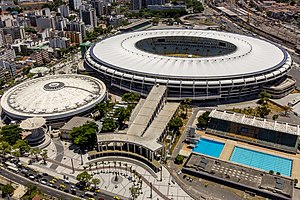Estadio Mario Filho
| Maracanã Stadium | |

Aerial view of the Maracanã complex in 2014, with the stadium visible at top and the Maracanãzinho at left
|
|
| Former names | Estádio do Maracanã (1950–1966) |
|---|---|
| Location | Maracanã, Rio de Janeiro, Brazil |
| Coordinates | 22°54′43.80″S 43°13′48.59″W / 22.9121667°S 43.2301639°WCoordinates: 22°54′43.80″S 43°13′48.59″W / 22.9121667°S 43.2301639°W |
| Public transit | Maracanã Station: SuperVia/Rio de Janeiro Metro |
| Owner | State of Rio de Janeiro |
| Operator | Complexo Maracanã Entretenimento S.A. (Odebrecht, IMX, AEG) |
| Capacity | 78,838 |
| Record attendance | 199,854 (16 July 1950) |
| Field size | 105 m × 68 m (344 ft × 223 ft) |
| Surface | Grass |
| Construction | |
| Broke ground | 2 August 1948 |
| Opened | 16 June 1950 |
| Renovated | 2000, 2006, 2013 |
| Closed | 2016 |
| Architect | Waldir Ramos, Raphael Galvão, Miguel Feldman, Oscar Valdetaro, Pedro Paulo B. Bastos, Orlando Azevedo, Antônio Dias Carneiro |
| Tenants | |
| Brazil national football team (1950–present) | |
The Maracanã (Portuguese: Estádio do Maracanã, standard Brazilian Portuguese: [esˈtadʒi.u du maɾakɐˈnɐ̃], local pronunciation: [iʃˈtadʒu du mɐˌɾakɐˈnɐ̃]), officially Estádio Jornalista Mário Filho (IPA: [iʃˈtadʒ(i)u ʒoʁnaˈliʃtɐ ˈmaɾi.u ˈfiʎu]), is a football stadium in Rio de Janeiro, Brazil. The stadium is part of a complex that includes an arena known by the name of Maracanãzinho, which means "The Little Maracanã" in Portuguese. Owned by the Rio de Janeiro state government, it is, as is the Maracanã neighborhood where it is located, named after the Rio Maracanã, a now canalized river in Rio de Janeiro.
The stadium was opened in 1950 to host the FIFA World Cup, in which Brazil was beaten 2–1 by Uruguay in the deciding game, in front of no less than 199,854 spectators on 16 July 1950. The venue has seen attendances of 150.000 or more at 26 occasions, the last being on 29 May 1983, as 155,253 spectators watched Flamengo beat Santos 3-0. At no less than 284 times have crowds of 100,000 or more watched football here. But as terraced sections have been replaced with seats over time, and after the more or less total renovation for the FIFA World Cup 2014, its original capacity has been reduced to the current 78,838.
...
Wikipedia
